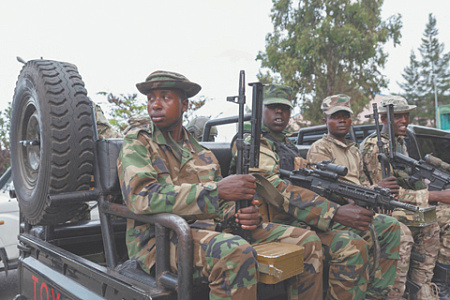
An attempt to stop the fighting in the Democratic Republic of the Congo (DRC) ended in failure. Rebels supported by neighboring Rwanda, who are fighting against government forces, refused to negotiate. They blamed the European Union for disrupting the dialogue. During the day of negotiations between the warring parties, which were supposed to be mediated by Angola, the EU imposed sanctions against the Rwandans and their Congolese allies. The expectation that the Europeans are interested in an early peace in the region, where the richest deposits of minerals are located, does not seem to have been justified.
The peace talks scheduled for March 18 between the pro-Rwandan “March 23 Movement” (M23) and the Congolese fighting in the DRC have been disrupted. It happened literally at the last moment. A Congolese delegation arrived in the Angolan capital of Luanda, where the talks were to take place. It was headed by the representative of the President of the DRC, Tina Salama. Already there, in Luanda, she learned that the M23 refused to participate in the negotiations. The group claims that the Congolese troops did not stop fighting during the meeting in Angola, as agreed, and the West, which had previously made it clear that it was neutral in the war, began to play along with the DRC. On March 17, the European Union imposed sanctions against the leadership of the M23 (nine people were on the sanctions list), officers of the Rwandan army and the Congo River Alliance coalition. The latter unites the Congolese allies of the M23. If the group positions itself as a defender of the Tutsi people (their representatives are in power in Rwanda) from the oppression of the Congolese government, then the Congo River Alliance counts DRC President Felix Chisekedi among its enemies and seeks his overthrow.
The claims of the M23 and their Rwandan patrons are addressed not so much to the EU as to the former metropolis of Belgium. President Paul Kagame of Rwanda had a loud argument with her just before the talks. The Rwandans gave the Belgian diplomats 48 hours to leave the country. Brussels allegedly “preserves neocolonial illusions” and “undermines the position” of Rwanda on all international platforms, including in the EU. Belgium is accused of preferring the DRC out of its two former colonies in the current conflict. The Belgian authorities responded by declaring all Rwandan diplomats in their country persona non grata. Belgian Foreign Minister Maxime Prevost expressed regret. Brussels called the severance of diplomatic relations between the two countries forced.
As a minimum condition for the resumption of negotiations, the M23 puts forward the lifting of sanctions against the five leaders of the movement. The speaker of the M23, Willy Ngoma, said that the international community does not promote dialogue, so it loses its meaning.
Success on the battlefield gives the Rwandans courage. M23 took Goma and Bukavu, the administrative centers of the provinces of North and South Kivu. At the UN level, it was stated that over 4,000 soldiers of the regular Rwandan army are fighting on the side of the M23. Kagame, despite numerous testimonies provided by the press and the UN, denies this fact. The Ngoma speaker also denies cooperation between M23 and Rwanda.
It is not only the EU or Belgium that is exerting international pressure on Rwanda. The UN Security Council also sided with the Congolese, adopting a resolution ordering the Rwandan authorities to withdraw troops from the DRC. In addition to the EU, the United States also managed to impose sanctions against Rwandan officials. Despite all this, the hopes of the DRC leadership that the 2012 scenario will repeat itself have not yet been fulfilled. Then the M23 captured Goma, but quickly left the city under international pressure. Now, there are suggestions in the media that it is easier for the West to deal with Kagame and his one of the least corrupt regimes in Africa than with the Congolese. After all, control over minerals, including rare earth metals (see NG dated 02/25.25), whose deposits are located in the Lake Kivu area, is at stake. Another thing is that the tragedies of civilians during the seizure of cities by M23 detachments do not escape the media and human rights activists. They make them public, which encourages politicians, primarily in Europe, to publicly define their attitude to the conflict.
